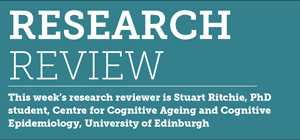
Research: The high heritability of educational achievement reflects many genetically influenced traits, not just intelligence Authors: Eva Krapohl, Kaili Rimfeld, et al.Proceedings of the National Academy of Sciences (PNAS) Proceedings of the National Academy of Sciences (PNAS)
Ok, I know that intelligence is really important for education, and that intelligence is genetic, so we can’t do anything about that. But what about hard work, social skills, and well-being? All these things lead to better school results too, and we know we can improve them!”
The problem is that this statement gets almost everything wrong. It forgets that, whereas it is true that intelligence is strongly heritable, nobody has ever claimed that it is 100 per cent genetically determined. More importantly, it forgets that characteristics such as conscientiousness, sociability and happiness are themselves genetically influenced.
This is the topic of a new paper by King’s College London geneticists Eva Krapohl, Kaili Rimfeld, and colleagues, published in the high-profile journal PNAS. They use data on more than 13,000 identical and non-identical twins from the UK-based TEDS (Twins Early Development Study) sample, comparing data from both types of twin to calculate the proportions of genetic and environmental influence on behaviours and traits.
Starting with the observation that educational achievement is heritable — in TEDS, genetic differences explain 62 per cent of the variation in GCSE results — they asked whether this is just another way of saying that intelligence is genetic. That is, are genetic studies of school results and of intelligence just measuring the same thing?
The answer is emphatically no. The authors found that a large chunk of the heritability of education is not explained by intelligence; in a complex statistical model, they showed that IQ score accounts for a quarter of the heritability of GCSE scores. Twenty-five per cent is a substantial chunk: indeed, IQ score makes the single largest contribution to the GCSE heritability of any trait measured in the study – and they measured a lot of traits.
Not including the two IQ measures, the twins filled in no fewer than 81 different questionnaires to tap educational self-efficacy, personality, well-being, behaviour problems, health, and school and home environment (bear in mind that most studies measure just one or two of these). These factors collectively accounted for a further 50 per cent of the heritability of education.
So we are at 75 per cent: three-quarters of the heritability of education can be explained by the heritabilities of a mix of all the factors above. Genes for education are, in large part, genes for intelligence, but also genes for personality, plus genes for motivation, plus the rest. So what accounts for the remaining quarter of the heritability? The authors don’t really speculate, but we might expect that even longer, more detailed questionnaires for each trait — as well as intelligence tests that cover more areas of cognition than the reasoning and vocabulary skills tested here — would do an even better job.
Because so many variables were studied, both the article itself and its online supplementary material section (both freely-downloadable at the PNAS website) are packed with information on the genetics of education: they should and will be used as a point of reference for years to come. The discussion towards the end on what our knowledge of genetics might imply for personalised learning (elaborated upon at more length by study co-authors Kathryn Asbury and Robert Plomin in their recent book G is for Genes) deserves to be read and debated by scientists, policymakers, and teachers.
Another view one often encounters when discussing genetics and education is this: “psychology is really complicated – isn’t everything a complex conjunction of genes and environments, too messy for science to disentangle?” Studies such as this one should dispel
this kind of pessimism. We can put reliable numbers on
the effects of genes versus environments on important
high-level outcomes such as education, and then begin to examine the underlying recipe of lower-level traits that explain them.
We most certainly don’t have all the answers yet, but large-scale, comprehensive analyses such as this one show that the answers are not outside our grasp.







